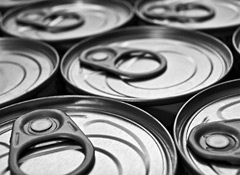Sign In

Menu
Suggested Searches
Recent Searches
Suggested Searches
Product Ratings
Resources
Chat With AskCR
Resources
All Products A-ZThe payment for your account couldn't be processed or you've canceled your account with us.
Re-activateMy account
Sign In
My account
Sign In


Families that switch to a diet high in fresh, organic foods and make other simple changes in the kitchen can reduce their levels of the potentially harmful chemical bisphenol A (BPA), suggests a small study out this week in Environmental Health Perspectives, published by the National Institutes of Health.
Some studies have linked BPA to reproductive abnormalities and a heightened risk of breast and prostate cancers, diabetes, and heart disease.
In the new study, researchers at the Breast Cancer Fund and the Silent Spring Institute tested levels of BPA in the urine of five families of four that had a high likelihood of regular exposure to BPA as a result of consuming canned foods, canned sodas, or frozen dinners; eating meals prepared outside the home or drinking from polycarbonate water bottles; or microwaving in plastic.
On the first two days of the study, the families ate their normal diets and provided urine samples that were tested for BPA. For the next three days, the families consumed only freshly prepared organic meals and snacks, avoiding any foods packaged in cans or plastic and using only glass and stainless steel food storage containers. Then, on the final two days, they returned to their normal diets.
The study found that when the families ate the fresh-food diet and avoided exposure to cans, plastic packaging, or polycarbonate bottles, BPA levels in their urine dropped on average by over 60 percent, and when they returned to their normal diets, their BPA levels soon returned to to original levels.
The study also measured levels of another endocrine-disruptor found in plastic packaging: the phthalate bis(2-ethylhexyl)phthalate, or DEHP for short. Results showed that markers for DEHP also dropped by more than 50 percent during the change-in-diet phase.
A previous Consumer Reports investigation found that found that almost all of the 19 name-brand foods we tested contain some BPA, and that children eating multiple servings per day of canned foods with BPA levels comparable to the ones we found in some tested products could get a dose of BPA near levels that have caused adverse effects in several animal studies.
Sources:
Food Packaging and Bisphenol A and Bis(2-Ethylhexyl) Phthalate Exposure: Findings from a Dietary Intervention [Environmental Health Perspectives]
—Andrea Rock
 Build & Buy Car Buying Service
Build & Buy Car Buying Service
Save thousands off MSRP with upfront dealer pricing information and a transparent car buying experience.
 Get Ratings on the go and compare
Get Ratings on the go and compare
while you shop